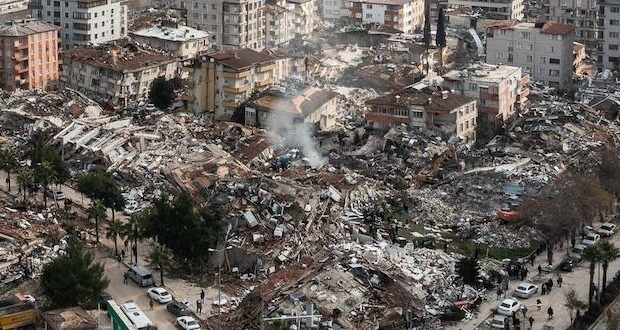The death toll from this week’s earthquakes in Turkey and Syria has surpassed 16,000. Some local authorities told media outlets that the number could triple in the coming days.
“We always see the same thing with earthquakes, unfortunately, which is that the initial reports of the numbers of people who have died or who have been injured will increase quite significantly in the week that follows,” the WHO’s senior emergency officer for Europe, Catherine Smallwood, told AFP.
Turkish President Recep Erdogan faces pressure over the government’s poor response to the crisis with his acknowledgment of what survivors call failures. Across the region, tens of thousands of buildings have collapsed, many of them high-rise apartment blocks. Thousands more are uninhabitable from damage.
“Of course, there are shortcomings. The conditions are clear to see. It’s not possible to be ready for a disaster like this,” Erdogan said on Feb. 7 while visiting Hatay, which has the highest death toll in the country, according to Sky News. “This is a time for unity, solidarity. I cannot stomach people conducting negative campaigns for political interest.”
Turkey’s death toll was at 12,873, according to officials. In Syria, 3,162 are thought to have died from the earthquake. Combined, the total deaths in the region come to 16,035.
People affected by the earthquake in southern Turkey have been battling freezing winter weather while waiting for the rescue of their family and friends.
READ: Christian aid ministries respond to Turkey, Syria
While rescuers continue pulling out people from the rubble, many Turkish citizens are complaining about a lack of support, expertise, and equipment to rescue those still trapped.
“Where is the state? Where have they been for two days? We are begging them. Let us do it, we can get them out,” Sabiha Alinak, from the city of Malatya where her young relatives are still trapped, said to Reuters.
According to Nasuh Mahruki, founder of a search and rescue group, the army failed to act on time to respond to the earthquake as the Erdogan administration had annulled a protocol that earlier allowed it to act without instructions.
“In the first seconds (after the 1999 quake), the Turkish Armed Forces started to work and were on the scene with the people within hours,” he told Reuters. “Now, it seems the responsibility is with AFAD [Disaster and Emergency Management Authority], but it is not prepared for such a colossal problem.”
People are also angered at an “earthquake tax,” which was charged by Turkish authorities following the 1999 quake that was supposed to be spent on the development of emergency services and disaster prevention efforts.
The mounting anger of citizens places Erdogan under pressure as the country’s elections are just a few months ahead on May 14.
Kemal Kilicdaroglu, the leader of Turkey’s main opposition party who is expected to be a presidential candidate, blamed Erdogan for not preparing enough to deal with earthquake incidents.
“If there is one person responsible for this, it is Erdogan,” he said, according to BBC. Erdogan’s administration “has not prepared for an earthquake for 20 years.”
In the aftermath of the earthquake, Twitter was blocked in Turkey on Feb. 8, according to watchdog organization NetBlocks. However, access to Twitter is being restored per a tweet update by the organization.
The government reportedly justified blocking Twitter by citing alleged “disinformation” about earthquakes. People are said to be furious about Erdogan’s slow response to the crisis, with his visit to earthquake victims being seen by many as a PR stunt.
–Wire services
 Metro Voice News Celebrating Faith, Family & Community
Metro Voice News Celebrating Faith, Family & Community









